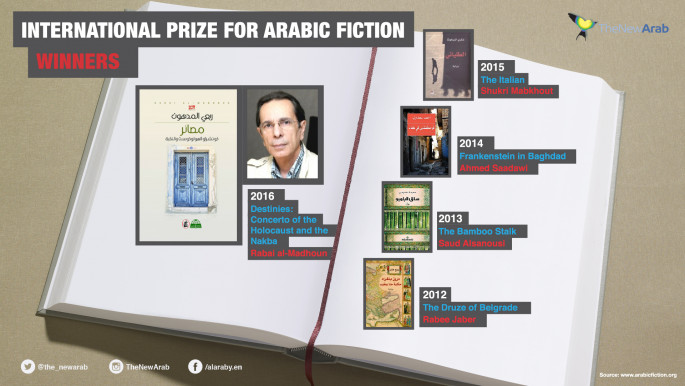Palestinian wins 'Arab Booker' with novel on Nakba, Holocaust
Palestinian author Rabai al-Madhoun has been named the winner of the International Prize for Arabic Fiction (IPAF), the most prestigious literary award in the Arab world.
He was awarded $50,000 and a guaranteed English translation of his winning novel, Destinies: Concerto of the Holocaust and the Nakba, which was selected out of 159 entries from 18 countries across the Arab World.
Madhoun is the first Palestinian author to receive the award, commonly referred to as the Arab Booker.
"Palestine rejoices today, as I rejoice," he said at the award ceremony in Abu Dhabi.
"If only for a year, the Palestinian novel sits on top of the Arab literary scene."
The 70-year-old novelist had a special message for the Palestinian city of Haifa, which he said "created this novel".
"[Haifa] has given me the taste, the details, the memory, the stories - the city that has taken me to all the cities of Palestine," he explained.
"How did we let this country go?" he said, quoting his novel during the ceremony.
Destinies, Madhoun's third novel, is considered a pioneering work. Each of its four parts represents a concerto movement, looking at the Holocaust, the Palestinian exodus from Israel in 1948 known as the Nakba and the Palestinian right to return.
Twitter Post
|
Amina Thiban, the Emirati poet and academic who chaired the five-member judging panel, praised the winning novel for its "passion".
"In Destinies: Concerto of the Holocaust and the Nakba, Rabai al-Madhoun invents a new fictional form in order to address the Palestinian issue, with questions of identity underpinned by a very human perspective on the struggle," she said in statement on behalf of the 2016 judging panel.
"This tragic, polyphonic novel borrows the symbol of the concerto, with its different movements, to represent the multiplicity of destinies."
Thiban added that the novel could be considered the "complete Palestinian novel", travelling back to a time before the Nakba in order to "shed light on current difficulties faced by the Palestinian diaspora and the sense of displacement felt by those left behind".
Professor Yasir Suleiman, chair of the board of IPAF trustees, described Madhoun as "one of the leading voices of his generation", adding that he hoped the award would take his novel to an even wider audience.
Madhoun said he aimed to have his book avoid giving answers.
"I make a habit of leaving my stories open-ended, fundamentally due to the fact that reality has never provided answers or resolutions for our big questions the crisis continues, and the Palestinians are still fighting and struggling for their rights."
Raised during the 'catastrophe'
The Palestinian novelist was born was born in the city of Ashkelon and raised in Gaza, which he left to attend Alexandria University in Egypt, later becoming involved with the Palestinian struggle as a member of the Democratic Front for the Liberation of Palestine.
He later lived in both Beirut and Cyprus before settling in London, where he works as an editor for Asharq al-Awsat newspaper.
| |
"As a Palestinian novelist, I was born and raised during the 'catastrophe' that spanned the period since before 1948 until now," Madhoun said in a video screened during the the IPAF awards ceremony.
"Consequently, I never lived a normal life in my homeland, and I moved between a number of Arab countries."
The 2016 prize shortlist comprised novels by five men and one woman, presenting narratives from Palestine, Morocco, Egypt, Syria and Lebanon.
They were also honoured at the ceremony; each of them, including the winner, received $10,000.
IPAF is run with the support of Britain's Booker Prize Foundation and funded by Abu Dhabi Tourism and Culture Authority. Next year, it will celebrate its tenth anniversary.
Since 2008, the winning and shortlisted IPAF books have been translated into more than 20 languages.
 |
| [Click to enlarge] |
![Rabai al-Madhoun - IPAF winner 2016 [IPAF] Rabai al-Madhoun - IPAF winner 2016 [IPAF]](/sites/default/files/styles/image_345x195/public/media/images/8CA0A40B-2B74-42B7-8925-2CA04B482C0A.jpg?h=d1cb525d&itok=lj8nMlIt)


